Our Work
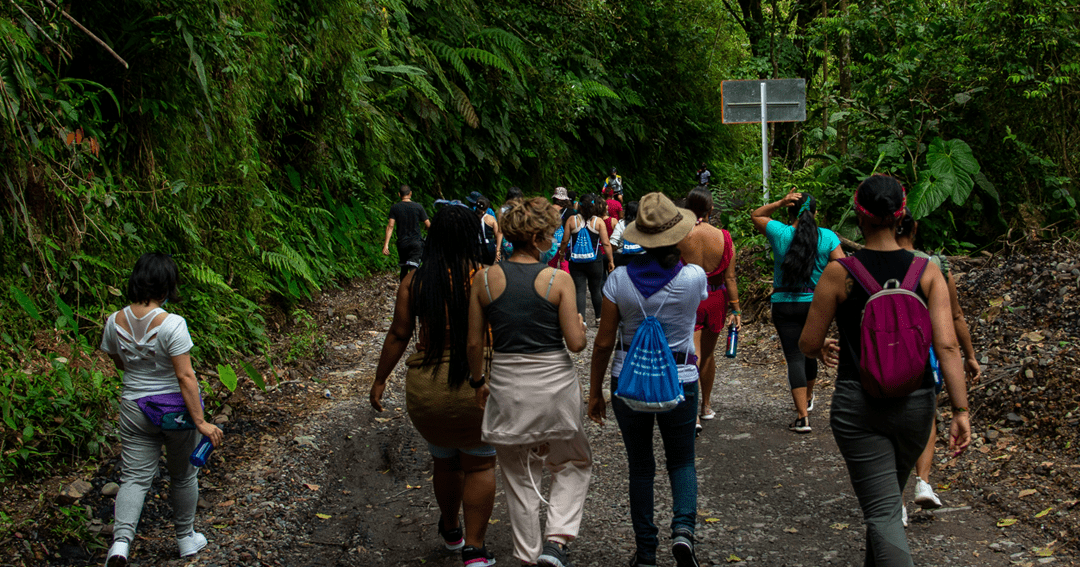
WILPF Colombia has been expanding its framework of reflections and actions by incorporating ecofeminist proposals, practices and commitments into the peacebuilding agendas of diverse women based on its work with collectives in the areas where it is present and with the WILPF network at the international level.
In this regard, we have been identifying the links between the ecological crisis and the environmental impacts of an extractivist, capitalist and militarized development model with the Women, Peace and Security Agenda. We seek to generate innovative contributions, from a critical perspective, based on the analysis of the local, national and international context on issues related to the situation of violence against women, the risks of women leaders and environmental defenders, the budgets allocated to the defense and security sector, as well as the impact that the production and trade of arms has on our country and on women's bodies.
We believe that ecofeminist perspectives offer elements that allow us to deepen the articulation of feminist agendas, territorial defenses and the care of life, the environment and nature. In this way we can have tools that allow us to recognize and replicate knowledge and practices based on the struggles of women defenders of environmental and territorial rights from their own narratives and experiences. Ecofeminism is a powerful articulating axis of social and environmental order that helps us to deconstruct extractivist and militarist logics and other forms of domination.
From this perspective, we seek to strengthen the processes of policy advocacy and the positioning of women's peace, security and development agendas that promote the transformation of the anthropocentric and male-centered power relations with nature, which are replicated in society through a model that exploits the land and women's bodies. Violence against territories is also violence against women and their sources of life.
Our actions are aimed at positioning the reflections and practices of diverse women on sustaining life and building a comprehensive and transformative peace that involves gender justice, environmental justice and other forms of security for women in relation to the care of the land, taking into account our interdependence and eco-dependence.

Espacio en construcción

Espacio en construcción

The Feminist School "Angela Salazar", whose name is adopted in recognition of the work of human rights defender and former peace commissioner Angela Salazar, aims to generate processes of dialogue, reflection and learning mainly with Colombian women interested in deepening their knowledge on issues related to peacebuilding from a feminist perspective.
It consists of a virtual training environment that responds to WILPF Colombia's strategic line of knowledge management. It is built with the purpose of reducing women’s inequality in access to knowledge, since it is completely free and easy to use on different devices. Its conceptual, pedagogical and methodological content design allows participants to access it independently and advance at their own pace through the topics and content, with the support of tutors who accompany the process of each course. In addition, it has a virtual webinar tool, to which, in each course, different people with diverse experiences and backgrounds are invited, which enriches the knowledge and dialogue with the participants.
Currently the platform has 3 courses implemented at the same time:
- "Women peacebuilders, a look at the effective implementation of UNSCR1325" a course that aims to bring women leaders and human rights defenders, and in general those interested in the subject, closer to the agenda of Women Peace and Security in Colombia. The content of the course reflects on the advances in the implementation of Resolution 1325 of the United Nations Security Council and related resolutions in the country, the construction of diverse discourses related to security, the differential ways women are affected by the armed conflict and their role in peacebuilding.
- "Antimilitarist Feminisms: women resisting in order to live in dignity". This course aims to promote a conceptual and practical approach to antimilitarist feminism, recognizing its background, practices and challenges in order to apply the tools in the daily contexts of the participants. To fulfill this purpose, the course is divided into four modules with two sessions each. Each module addresses a carefully chosen theme for the study and understanding of antimilitarist feminism. The topics build a clearer picture of the reasons why there is a need to talk about antimilitarist feminism, while maintaining the critical lens of the gender approach.
- Virtual certified course "Socio-legal tools for a comprehensive approach to gender-based violence and violence against women". In alliance with the Gender Center of the Universidad del Bosque and ICCO Cooperation, this virtual course is being implemented with the objective of strengthening the comprehensive institutional response and the capacities of public officials of state entities involved in the GBV and VAW attention route, with socio-legal tools for the stages of identification, prevention, investigation and prosecution of the crime, and in the service of the victims. This course encourages the analysis of gender-based violence and violence against women as social phenomena that are due to structural factors that facilitate and promote situations of discrimination and violent environments. In addition, it recognzes that different specific conditions of women, such as their origin, ethnicity, age, diverse capacities, gender identity and/or sexual orientation, among others, produce differentiated effects that require appropriate protection systems and actions to safeguard their rights.
We invite you to learn more about the courses and keep informed through the following link https://formacion.limpalcolombia.org/
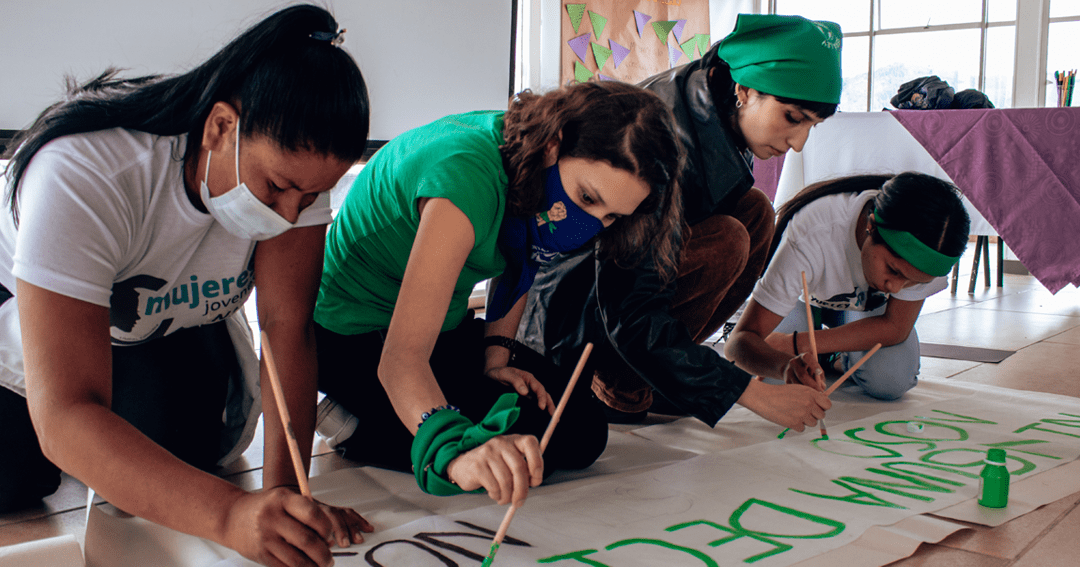
LIMPAL Joven is a strategy that is in line with YOUNG WILPF, a global commitment that links youth perspectives to the women's processes led by the international WILPF movement.
In Colombia, this process began in 2021, gathering the cumulative experience of WILPF Colombia gained by working with young women since 1998, with the purpose of contributing to the strengthening of collective commitments, advocacy and exchanges of experiences in Meta, Bolivar and Guaviare which in their diversities present different agendas around the recognition of their rights. Through the accompaniment of their organizational initiatives, their involvement in activities such as the Feminist School, active participation in the formulation of proposals related to the care of the body and the land, and in national meetings, we promote safe spaces where young women experience an environment of listening, contribution and visibility of the ideas and knowledge that are being built around their being, corporality, diverse identities and their organizational and collective processes.
We recognize that young women bring different languages and expressions that allow for a dialogue with the world in which they question the adultcentrism of patriarchy and systems of oppression and demand a place where their voices are amplified.
The process of building Limpal Joven is in a stage of strengthening networks, based on the "first meeting of young women for a feminist and transformative peace" held in Bogota in September 2021 which was attended by more than 25 young women. Together the first strategic goals were defined:
- Strengthening young feminist leadership
- Regional perspectives and positioning of young women's agendas
- Tools for sustainable activism
Limpal Joven is a dynamic strategy in continuous construction that relies on the strength and power of young women who increasingly participate in the regional processes of WILPF Colombia, in coordination with the international strategy YOUNG WILPF.
We hope to continue strengthening these focus areas and nurture them from approaches such as antimilitarist and intersectional feminism, ecofeminism and care for life, pacifist feminism and nonviolence, by promoting innovative actions from diverse young women related to artistic narratives with a feminist political and peacebuilding perspective.
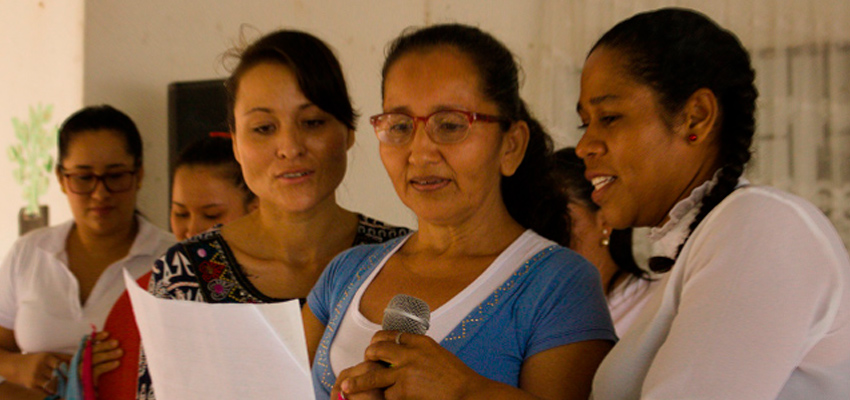
We are part of:
National Summit of Women and Peace: Alliance of 8 women's organizations, networks and platforms, where more than 1500 organizations of mixed, ethnic, peasant, indigenous, Afro-descendant, student and youth women from all over the country participate, which in addition to carrying out their own regional and local processes, decided to join around 4 purposes:
Alliance of 8 women's organizations, networks and platforms, where more than 1500 organizations of mixed, ethnic, peasant, indigenous, Afro-descendant, student and youth women from all over the country participate, which in addition to carrying out their own regional and local processes, decided to join around 4 purposes:
- Become a social collective with political power to act and decide on the construction of peace with social justice.
- Be pactantes in all peace processes that take place in the country between the national government and armed groups.
- Influence the end of the conflict conversation table.
- Influence the participation mechanisms derived from the agreement between the parties, as well as the endorsement, verification and implementation of the Final Agreement, taking into account what is included in it, related to the rights of women from their diverse identities.
1325 Coalition In Colombia, since 2011, different organizations decided to join together to advocate and seek the implementation of Resolution 1325. Some of the actions of the Coalition are:
In Colombia, since 2011, different organizations decided to join together to advocate and seek the implementation of Resolution 1325. Some of the actions of the Coalition are:
- Follow-up to the implementation of UNSCR 1325 by the state.
- Preparation and publication of the Annual Monitoring Report of UNSCR 1325.
- Incidence before state entities for the elaboration of a National Plan of Action in UNSCR 1325.
- Training for women leaders or state officials in UNSCR 1325 and related resolutions.
Thought and Action Collective "Women, Peace and Security" The MPS Collective is an initiative for dialogue and reconciliation between women from different social, economic and political spheres, including human rights activists, academics, ex-combatants, members of the security sector, indigenous and Afro-descendant women, journalists and women dedicated to business. All the women who are part of the collective share the commitment to a better future for Colombia based on peace and human security. These women’s thinking is embodied in the Ethical Pact for Peace, which shows step by step how civil society can transform violence from everyday life.
The MPS Collective is an initiative for dialogue and reconciliation between women from different social, economic and political spheres, including human rights activists, academics, ex-combatants, members of the security sector, indigenous and Afro-descendant women, journalists and women dedicated to business. All the women who are part of the collective share the commitment to a better future for Colombia based on peace and human security. These women’s thinking is embodied in the Ethical Pact for Peace, which shows step by step how civil society can transform violence from everyday life.
At the local level, we articulate with the movement of women and victims.
Internationally, we are part of WILPF and have consultative status with the UN: ECOSOC, UNCTAD, and UNESCO, as well as special relations with FAO, ILO and UNICEF. In addition, we participate in the sessions of the Committee on the Elimination of Discrimination against Women (CEDAW).
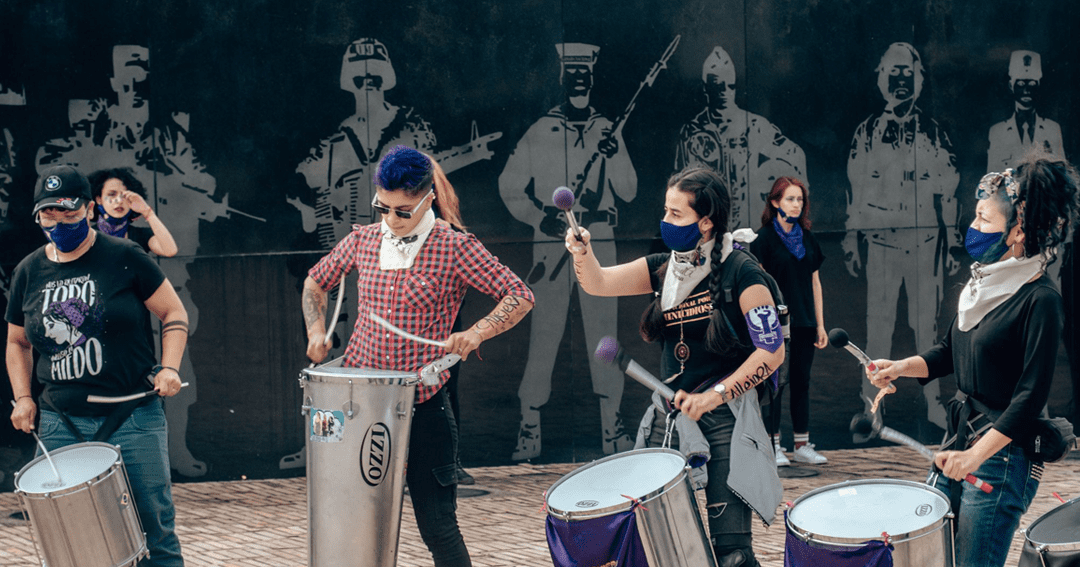
At WILPF Colombia we recognize that cisgender men, trans men and men of diverse sexual orientations should have a role in the transformation of patriarchal structures that affect, in various ways, the socio-political and cultural composition of our country and the world. When we speak of masculinities, it is more accurate to speak in the plural in order to move away from reductionist conclusions about the gender expressions associated with men, since there is not only one type of masculinity. Masculinities are multiple and vary according to the cultural context and the subjective experiences in which they are developed, since they are collective social constructions that take shape in specific and simultaneously diverse practices. Different types of masculinities coexist in the same culture and are constructed, shaped, and changed by the hierarchical, transformational or exclusionary relationships they have.
From an awareness of the responsibility of social and citizen movements to place themselves within the framework of critical reflections, and based on our antimilitarist approach, at WILPF Colombia, we promote dialogues on hegemonic and militarized masculinities that are located within a system of gender-based power relations which constitutes patriarchy. This reflection allows us, in line with Cynthia Cockburn's analysis, to understand masculinities as a social construct, which takes shape in the spaces men occupy and how they occupy them. In this understanding, masculinities and their construction can be institutionalized, especially when referring to hegemonic masculinities, since these are in the State’s interest to reproduce.
These types of masculinities have been a concern of WILPF Colombia because of the violent effects they have on the bodies and lives of women. In a militarized country derived from a colonizing heritage, like ours, it is necessary to explore, reflect and transform the way in which these masculinities are constructed, since they are oppressive and violent towards women -for example, in interpersonal relationships, in the family, school, the State, the street, etc.-. There are countless forms of violence against women that, in part, are made possible because the masculinities that are constructed in our Colombian society are marked by militarism, hierarchy and violence.
Through our work in the country we have explored these points in greater depth in publications such as Feminist Voices: dialogues from pacifism and antimilitarism, as well as in the development of symbolic actions and solidarity dialogues that seek to Confront Militarized Masculinities. Therefore, through knowledge management, the transformation of imaginaries, community work, pedagogy and political action, WILPF Colombia works to promote alternative constructions of masculinities that promote equality and the recognition of women as political subjects.
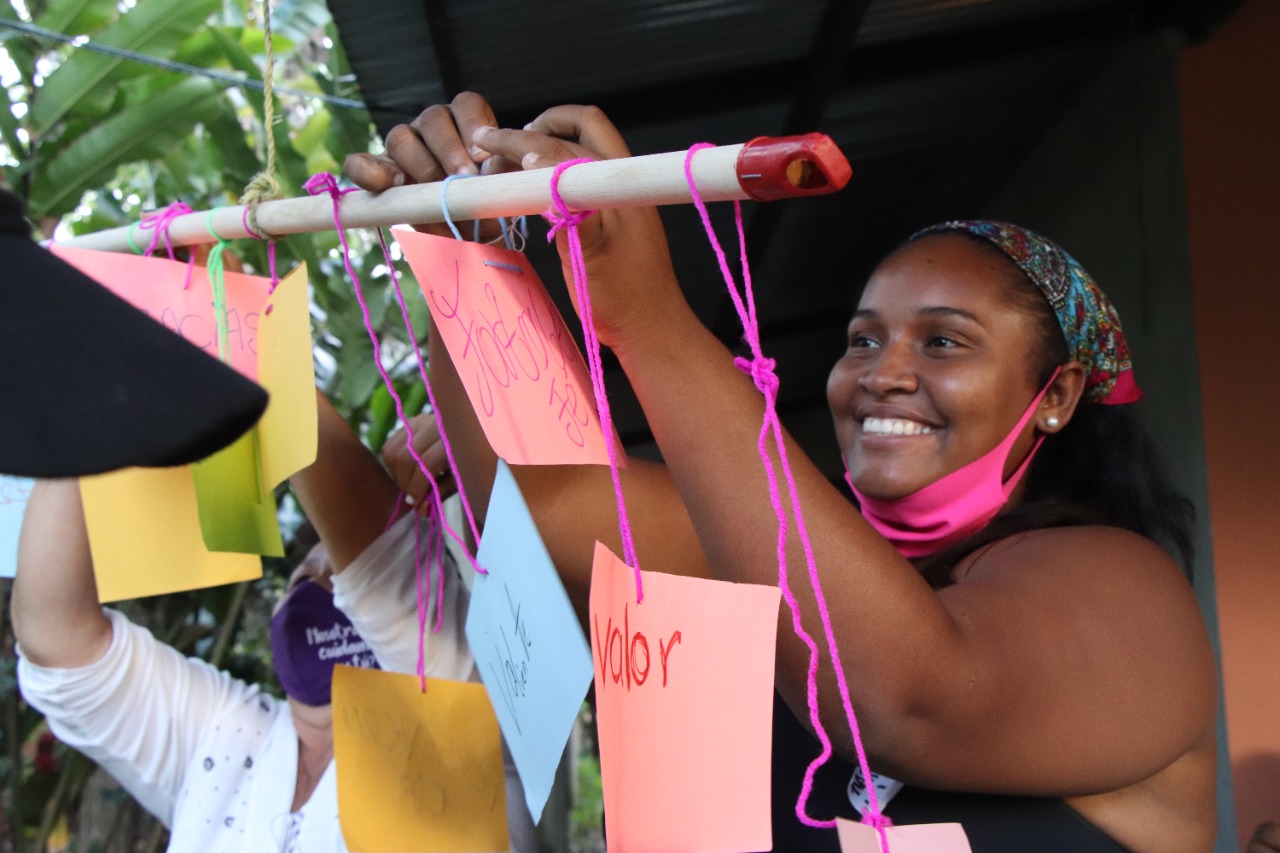
In Limpal we advocate for the recognition, defense and protection of the human rights of women and girls as a way to achieve peace. This commitment is carried out from a feminist and intersectional approach, which recognizes the diversity in terms of class, ethnicity and gender that women have and the specificities of defending their rights in Colombia.
Here some of our reasons:
![]() According to the WIN-Mujer survey (2017), only 20% of Colombians think that in Colombia their rights are respected.
According to the WIN-Mujer survey (2017), only 20% of Colombians think that in Colombia their rights are respected.
![]() Although the country has a solid legal framework to guarantee the rights of women and girls, in practice there are many barriers on issues such as political participation, the labor and care field and the right to a life free of violence within and outside the armed conflict.
Although the country has a solid legal framework to guarantee the rights of women and girls, in practice there are many barriers on issues such as political participation, the labor and care field and the right to a life free of violence within and outside the armed conflict.
![]() In the new post-conflict stage in Colombia, aggressions against social leaders have increased. 155 of them were killed during 2018, and 583 were threatened to prevent them from continuing their work in defense of human rights.
In the new post-conflict stage in Colombia, aggressions against social leaders have increased. 155 of them were killed during 2018, and 583 were threatened to prevent them from continuing their work in defense of human rights.
Our work defending the rights of women and girls is based on the idea that their full and effective guarantee depends on social change. In this sense, we accompany the women of the territories in their process of their own recognition as subjects of rights. This is done through training workshops and psychosocial and legal support, so that these women subsequently carry out advocacy processes to improve their quality of life.
In addition, we investigate the different manifestations of the violations of rights suffered by women and girls and disseminate pedagogical and communicative contents that seek to sensitize public opinion on this issue. At an international level, in collaboration with our WILPF sisters, we raise our voice about the situation of women's and girls' rights in Colombia.
Some of our postulates are:
![]() Human rights violations of women and girls in Colombia are recurring and unacceptable. The Colombian government and its institutions must commit to the guarantee of their rights and attack the barriers that exist to access measures of protection, attention and access to justice.
Human rights violations of women and girls in Colombia are recurring and unacceptable. The Colombian government and its institutions must commit to the guarantee of their rights and attack the barriers that exist to access measures of protection, attention and access to justice.
![]() An action plan is urgently needed by the national government that definitively stops the murders and aggressions of social leaders, as well as of all people in the process of reinstatement. The voice of the mentioned women victims is the voice of the defense of human rights in the territories of Colombia.
An action plan is urgently needed by the national government that definitively stops the murders and aggressions of social leaders, as well as of all people in the process of reinstatement. The voice of the mentioned women victims is the voice of the defense of human rights in the territories of Colombia.
![]() For the effective guarantee of women's human rights, it is important that the entire United Nations system continues to be present in the territories that sustains and helps consolidate peace.
For the effective guarantee of women's human rights, it is important that the entire United Nations system continues to be present in the territories that sustains and helps consolidate peace.

WILPF Colombia is a feminist, pacifist and antimilitarist organization that promotes spaces for reflection, construction and transformation of militarist structures and actions of militarization that, from a feminist point of view, have made women's lives and bodies even more precarious.
In this sense, the feminism that we promote, from our intersectional commitment, and based on which we work at WILPF, is concerned with identifying and transforming the colonialist practices and frameworks that have hierarcically organized the racialized and feminized bodies in Colombian society. Hence, we recognize that one of the most powerful systems of oppression is militarism, which we identify as a framework that has not only influenced Colombian society in its socio-political composition, but has also deeply constrained the construction of women's identities. Therefore, for WILPF anti-militarist feminism is absolutely indispensable as it allows us to analyze, understand, criticize and dismantle, from an intersectional perspective, the militarized structures that ultimately make women's lives more precarious.
In the current Colombian context, militarism has been further exacerbated through police violence, war and the use of weapons and the imposition of militaristic ideologies. From this, the need arises to amplify feminist voices that promote antimilitarism as an alternative. Therefore, WILPF Colombia contributes through knowledge management to the construction of feminist peace from the antimilitarist approach. We do this through training activities, such as the course “Antimilitarist Feminisms: women resisting in order to live in dignity”, publications, such as “Feminist voices: dialogues from pacifism and antimilitarism”, and research on this subject. In these spaces we map the trail of antimilitarist feminism that starts from a historical and material need in order to build new fields of interpretation that place life and dignity at the center to achieve security. Our work promotes a conceptual and practical approach to antimilitarist feminism, recognizing its background, practices and challenges and disseminating this political commitment within the organization and in the groups and networks that we are part of.
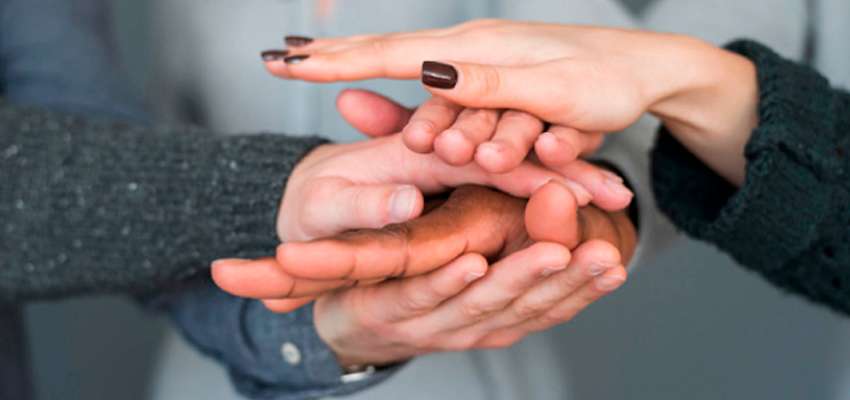 WILPF was born internationally as a feminist movement in defense of peace and its efforts continue towards peacebuilding with and for women in more than 43 countries around the world. In Colombia, women have been building peace for over 60 years of armed conflict. WILPF Colombia bets on the negotiated solution materialized in the Final Peace Agreement and we continue our work to recognize the power of women in building peace.
WILPF was born internationally as a feminist movement in defense of peace and its efforts continue towards peacebuilding with and for women in more than 43 countries around the world. In Colombia, women have been building peace for over 60 years of armed conflict. WILPF Colombia bets on the negotiated solution materialized in the Final Peace Agreement and we continue our work to recognize the power of women in building peace.
Here are some of the reasons why we believe it is necessary to fight for a feminist peace:
![]() According to the UNDP data, a society with economic inequality, marginalization, exclusion and discrimination is a society where violence and armed conflict are most likely to occur. The persistence of the patriarchal and military system, therefore, is a strong threat against the stability of peace. (World Development Report - 2011).
According to the UNDP data, a society with economic inequality, marginalization, exclusion and discrimination is a society where violence and armed conflict are most likely to occur. The persistence of the patriarchal and military system, therefore, is a strong threat against the stability of peace. (World Development Report - 2011).
![]() Recent research publications has shown that when peace processes are inclusive and have the full participation of women, they have a better chance of success and durability. (Report “Peace processes with a gender perspective. Inclusiveness and participation” - 2016).
Recent research publications has shown that when peace processes are inclusive and have the full participation of women, they have a better chance of success and durability. (Report “Peace processes with a gender perspective. Inclusiveness and participation” - 2016).
![]() The peace process in Colombia has been recognized internationally as an example for the incorporation of the gender perspective. This is a window of opportunity to demand the participation of women in the post-conflict process of the country.
The peace process in Colombia has been recognized internationally as an example for the incorporation of the gender perspective. This is a window of opportunity to demand the participation of women in the post-conflict process of the country.
Our work in peacebuilding occurs from advocacy and training. Through activism we monitor the implementation of the Final Peace Agreement and the effective incorporation of the gender perspective measures contained therein, mainly from the National Summit of Women and Peace (link to advocacy platforms). As for training, we carry out processes with women in the territories such as the Feminist School for Peacebuilding that seeks to strengthen theoretical and legal knowledge about feminisms and peacebuilding so that those are the same women leaders who do the local and territorial activist process.
Some of our postulates regarding peace building are:
![]() Peace depends on the improvement of the situation and quality of life of women.
Peace depends on the improvement of the situation and quality of life of women.
![]() The participation of women in peace processes is a commitment to building a more inclusive, egalitarian and democratic society.
The participation of women in peace processes is a commitment to building a more inclusive, egalitarian and democratic society.
![]() It is essential that women be heard, recognized and included in all instances of implementation of the Final Peace Agreement, as well as in the post-conflict process that Colombia is experiencing.
It is essential that women be heard, recognized and included in all instances of implementation of the Final Peace Agreement, as well as in the post-conflict process that Colombia is experiencing.


